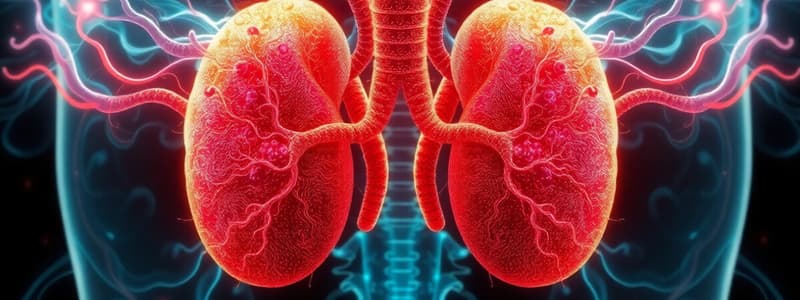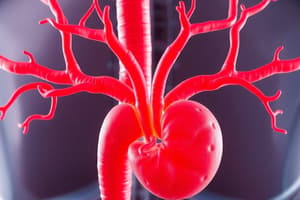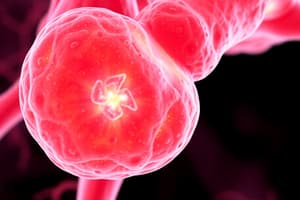Podcast
Questions and Answers
What is primarily secreted by the zona glomerulosa of the adrenal cortex?
What is primarily secreted by the zona glomerulosa of the adrenal cortex?
- Cortisol
- Aldosterone (correct)
- Dopamine
- Corticosterone
Which component of the adrenal glands is responsible for releasing catecholamines?
Which component of the adrenal glands is responsible for releasing catecholamines?
- Zona reticularis
- Cortex
- Zona fasciculata
- Medulla (correct)
What is the main function of glucocorticoids?
What is the main function of glucocorticoids?
- Stimulate mineral absorption
- Secrete adrenaline and noradrenaline
- Maintain electrolyte balance
- Influence carbohydrate and protein metabolism (correct)
Which steroid hormone is synthesized from pregnenolone?
Which steroid hormone is synthesized from pregnenolone?
Which hormone is NOT classified as a mineralocorticoid?
Which hormone is NOT classified as a mineralocorticoid?
What regulates the biosynthesis of glucocorticoids and mineralocorticoids?
What regulates the biosynthesis of glucocorticoids and mineralocorticoids?
Which of the following is a glucocorticoid secreted by the zona fasciculata?
Which of the following is a glucocorticoid secreted by the zona fasciculata?
Which adrenal hormone is primarily involved in stress response?
Which adrenal hormone is primarily involved in stress response?
What changes occur in the musculoskeletal system due to glucocorticoid actions?
What changes occur in the musculoskeletal system due to glucocorticoid actions?
What is a key characteristic of Addison's disease regarding hormone production?
What is a key characteristic of Addison's disease regarding hormone production?
Which condition is NOT typically treated with glucocorticoids?
Which condition is NOT typically treated with glucocorticoids?
How do glucocorticoids affect sodium and potassium in the cardiovascular system?
How do glucocorticoids affect sodium and potassium in the cardiovascular system?
What is a potential consequence of elevated glucocorticoids in the skin?
What is a potential consequence of elevated glucocorticoids in the skin?
In which of the following scenarios would glucocorticoids be administered intravenously?
In which of the following scenarios would glucocorticoids be administered intravenously?
Which formulation of glucocorticoids is preferred for treating conditions in areas with thinner skin?
Which formulation of glucocorticoids is preferred for treating conditions in areas with thinner skin?
Which of the following diseases with autoimmune components is a common indication for glucocorticoid therapy?
Which of the following diseases with autoimmune components is a common indication for glucocorticoid therapy?
What triggers the synthesis of mineralocorticoids?
What triggers the synthesis of mineralocorticoids?
Which process is primarily induced by glucocorticoids related to carbohydrates?
Which process is primarily induced by glucocorticoids related to carbohydrates?
What is the primary action of glucocorticoids on protein metabolism?
What is the primary action of glucocorticoids on protein metabolism?
What is one physiological effect of glucocorticoids on inflammation and immunity?
What is one physiological effect of glucocorticoids on inflammation and immunity?
How does cortisol exert its actions in the body?
How does cortisol exert its actions in the body?
Which of the following is a consequence of excessive glucocorticoid levels?
Which of the following is a consequence of excessive glucocorticoid levels?
What role does the hypothalamo-pituitary-adrenal (HPA) axis play in glucocorticoid synthesis?
What role does the hypothalamo-pituitary-adrenal (HPA) axis play in glucocorticoid synthesis?
What is the effect of glucocorticoids on lipid metabolism?
What is the effect of glucocorticoids on lipid metabolism?
Which glucocorticoid is specifically noted for promoting fetal lung maturation in premature newborns?
Which glucocorticoid is specifically noted for promoting fetal lung maturation in premature newborns?
What is one of the effects of glucocorticoids on the immune system?
What is one of the effects of glucocorticoids on the immune system?
In the treatment of hypercalcemia, glucocorticoids help normalize calcium levels by which mechanism?
In the treatment of hypercalcemia, glucocorticoids help normalize calcium levels by which mechanism?
Prolonged use of supraphysiologic doses of glucocorticoids can lead to which syndrome?
Prolonged use of supraphysiologic doses of glucocorticoids can lead to which syndrome?
What is a common dermatological adverse effect associated with glucocorticoid therapy?
What is a common dermatological adverse effect associated with glucocorticoid therapy?
What happens to adrenal cortex function after discontinuing glucocorticoid therapy?
What happens to adrenal cortex function after discontinuing glucocorticoid therapy?
What metabolic alteration can occur with the use of glucocorticoids?
What metabolic alteration can occur with the use of glucocorticoids?
What is one of the consequences of glucocorticoids stimulating gastric acid production?
What is one of the consequences of glucocorticoids stimulating gastric acid production?
Flashcards
Adrenal Cortex
Adrenal Cortex
The outer layer of the adrenal glands, responsible for producing steroid hormones like cortisol and aldosterone.
Mineralocorticoids
Mineralocorticoids
Steroid hormones produced by the adrenal cortex, crucial for managing mineral balance, especially sodium and potassium.
Aldosterone
Aldosterone
A key mineralocorticoid produced by the adrenal cortex, primarily responsible for regulating sodium and potassium levels in the body.
Glucocorticoids
Glucocorticoids
Signup and view all the flashcards
Cortisol
Cortisol
Signup and view all the flashcards
Steroidogenesis
Steroidogenesis
Signup and view all the flashcards
Hypothalamic-Pituitary-Adrenal (HPA) Axis
Hypothalamic-Pituitary-Adrenal (HPA) Axis
Signup and view all the flashcards
ACTH (Adrenocorticotropic Hormone)
ACTH (Adrenocorticotropic Hormone)
Signup and view all the flashcards
Negative Feedback Action of Glucocorticoids
Negative Feedback Action of Glucocorticoids
Signup and view all the flashcards
Cardiovascular Effects of Glucocorticoids
Cardiovascular Effects of Glucocorticoids
Signup and view all the flashcards
Glucocorticoids and Mood
Glucocorticoids and Mood
Signup and view all the flashcards
Glucocorticoid Effect on Bone Health
Glucocorticoid Effect on Bone Health
Signup and view all the flashcards
Immunosuppressive Effects of Glucocorticoids
Immunosuppressive Effects of Glucocorticoids
Signup and view all the flashcards
What is the HPA axis?
What is the HPA axis?
Signup and view all the flashcards
What is cortisol?
What is cortisol?
Signup and view all the flashcards
Glucocorticoids in Addison's Disease
Glucocorticoids in Addison's Disease
Signup and view all the flashcards
Topical Glucocorticoids for Inflammation
Topical Glucocorticoids for Inflammation
Signup and view all the flashcards
What are the metabolic actions of glucocorticoids?
What are the metabolic actions of glucocorticoids?
Signup and view all the flashcards
Glucocorticoid Potency
Glucocorticoid Potency
Signup and view all the flashcards
What are the anti-inflammatory actions of glucocorticoids?
What are the anti-inflammatory actions of glucocorticoids?
Signup and view all the flashcards
How do glucocorticoids work at the cellular level?
How do glucocorticoids work at the cellular level?
Signup and view all the flashcards
How do glucocorticoid and mineralocorticoid receptors differ?
How do glucocorticoid and mineralocorticoid receptors differ?
Signup and view all the flashcards
What is a common use of dexamethasone in cancer treatment?
What is a common use of dexamethasone in cancer treatment?
Signup and view all the flashcards
How do glucocorticoids help premature babies?
How do glucocorticoids help premature babies?
Signup and view all the flashcards
How do glucocorticoids treat hypercalcemia in sarcoidosis?
How do glucocorticoids treat hypercalcemia in sarcoidosis?
Signup and view all the flashcards
How do glucocorticoids work in preventing organ graft rejection?
How do glucocorticoids work in preventing organ graft rejection?
Signup and view all the flashcards
What are the potential side effects of long-term glucocorticoid use?
What are the potential side effects of long-term glucocorticoid use?
Signup and view all the flashcards
How do glucocorticoids affect the adrenal cortex?
How do glucocorticoids affect the adrenal cortex?
Signup and view all the flashcards
What are some other potential adverse effects of glucocorticoids?
What are some other potential adverse effects of glucocorticoids?
Signup and view all the flashcards
What are glucocorticoids?
What are glucocorticoids?
Signup and view all the flashcards
Study Notes
Glucocorticoids
- Glucocorticoids are steroid hormones secreted by the adrenal cortex.
- They influence carbohydrate and protein metabolism and regulate defense mechanisms.
- Their synthesis is regulated by the hypothalamic-pituitary axis, specifically by ACTH from the anterior pituitary.
- Cortisol, a major glucocorticoid, is released in a circadian rhythm, with peak levels in the morning.
- Glucocorticoids play a role in regulating water and electrolyte balance via mineralocorticoid receptors.
Adrenal Glands
- Adrenal glands are located on top of the kidneys.
- They are composed of two parts: medulla and cortex.
- The medulla (inner part) produces catecholamines (epinephrine, norepinephrine, and dopamine).
- The cortex (outer part) secretes steroid hormones, including glucocorticoids and mineralocorticoids.
Types of Cortical Steroids
- Mineralocorticoids: Regulate water and electrolyte balance. Aldosterone is a key example.
- Glucocorticoids: Influence carbohydrate metabolism. Cortisol is a primary example.
- Gonadocorticoids: Influence reproductive function.
Mechanism of Action
- Glucocorticoids interact with intracellular receptors.
- The receptor-steroid complex affects DNA and gene transcription.
- This leads to the altered production of proteins.
Metabolic Actions
- Influence carbohydrate metabolism: Increased gluconeogenesis and decreased glucose uptake, leading to hyperglycemia.
- Increased glycogen storage
- Effect on proteins: Increased protein catabolism (tissue wasting).
- Effect on lipids: Increased lipolysis.
Regulatory Actions
- Immune function: Decreased inflammatory response and immune cell activity.
- Effect on lymphoid tissues: Decreased clonal expansion of T and B cells.
- Bone density: Decreased osteoblast activity and increased osteoclast activity, leading to osteoporosis.
- Cardiovascular effects: Increase blood pressure.
- Psychological effect: Mood alterations.
- Other: Affect the hypothalamic-pituitary-adrenal (HPA) axis by negative feedback, and influence the anterior pituitary to reduce the release of endogenous glucocorticoids.
Clinical Uses
- Replacement therapy: For Addison's Disease (adrenal insufficiency), chronic adrenal insufficiency.
- Anti-inflammatory and immunosuppressant therapy: Asthma, inflammatory skin conditions, allergic reactions, autoimmune diseases, transplant rejection, and some cancers.
Adverse Effects
- Cushing Syndrome: Characteristic features include "moon face," buffalo hump, central obesity, skin thinning, and muscle wasting.
- Atrophy of the Adrenal Cortex: Prolonged use can cause atrophy of the adrenal cortex, and reduced natural production of cortisol.
- Other: Hyperglycemia, hypertension, alterations in mood, peptic ulcers, growth retardation in children, osteoporosis.
Contraindications
- Patients with severe conditions such as psychosis, peptic ulcers, heart disease, hypertension, diabetes mellitus, osteoporosis, and certain infections.
Types of Glucocorticoid Drugs
-
Different drugs have varying durations of action, mineralocorticoid potency, and anti-inflammatory potency.
-
Hydrocortisone, Cortisone, Deflazacort, Prednisolone, Prednisone, Methylprednisolone, Triamcinolone, Dexamethasone, Betamethasone are all examples of glucocorticoid drugs.
Studying That Suits You
Use AI to generate personalized quizzes and flashcards to suit your learning preferences.




